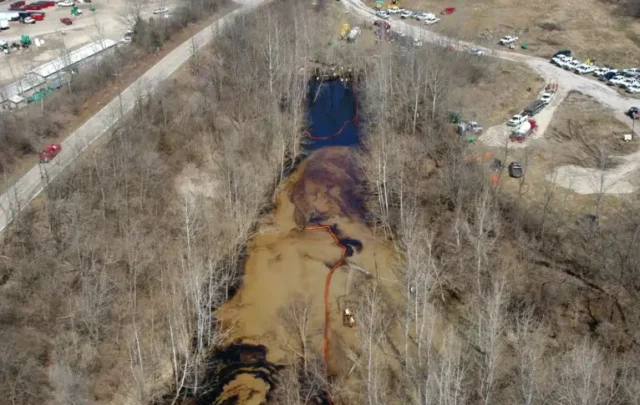Click on the headline (link) for the full text.
Many more articles are available through the Energy Bulletin homepage.
UPDATE 2-US to require details of fracking on federal land
Ayesha Rascoe, Reuters
The U.S. Interior Department plans to issue a proposal soon forcing companies to reveal the chemicals they use in the so-called fracking drilling process on federal lands, as the Obama administration responds to public safety concerns over the shale exploration boom.
David Hayes, deputy secretary at the Interior Department, told a federal shale gas advisory panel on Monday that the department hopes to issue disclosure rules for hydraulic fracturing on federal lands in “a couple of months.” It plans to finalize the guidelines about 12 months after that.
Hydraulic fracturing involves injecting a mix of water, sand, and chemicals into shale formations at high pressures to extract oil and gas.
“The high level of concern about the nature of fracking chemicals suggests the complete disclosure of all chemical components and composition of fracking fluids would improve public confidence,” Hayes told the Energy Department’s shale gas panel.
Calling the current hydraulic fracturing rules that were developed in 1982 “outdated,” Hayes said the department is also working to develop rules focused on ensuring well integrity and managing waste water…
(31 October 2011)
When Transition meets fracking, and wins. The story of Transitions Cowbridge and Llantwit.
Michaela, Rob & Dinky, Transition culture
Thursday 20 October 2011 was a landmark day in the Vale of Glamorgan and one that will have a knock-on effect around the country and hopefully beyond. It was a day where community power helped to bring about a unanimous decision by the local county council to deny Coastal Oil & Gas the right to test for shale gas at an industrial estate on the outskirts of the village of Llandow.
A few months prior to this, in February 2011, all that stood between the multi-billion dollar highly environmentally damaging fracking industry and a test drill being carried out in the Vale was one individual. Louise Evans runs a nearby caravan park and when she found out what was being planned she started researching the fracking process and raising awareness. Louise set up a web site and the ‘Vale Says No’ campaign was born.
The local Transition towns, Transition Cowbridge and Transition Llantwit, have been active for the past three years. From the work already done we knew that there was a part of the community that did not need any convincing that something that had the potential to cause significant environmental damage, as well as keeping the focus on an unsustainable finite energy source, should be halted. However, as the wider community have not yet seen the light and moved to a more positive and resilient way of life, both Transition groups donned their awareness raising hats to focus their energies on supporting the Vale Says No campaign.
The Vale Says No set up several public meetings to bring the issue of fracking and its consequences to the public’s attention. Both Transition groups used their existing networks to rally as many supporters as possible. This not only helped to generate a significant number of letters of objection, it was during one of these meetings that Coastal Oil & Gas was made aware that they had failed to consider a house only 200m away from the possible drilling site in their application. This resulted in them withdrawing their application and bought the campaign some much needed time to carry out research into the company and gather further evidence.
As soon as Coastal Oil & Gas re-applied for planning, everyone was quick off the mark and Transition Cowbridge hosted a public meeting to a full house in the Town Hall. Word was spread via the website, the local press and by hand delivering invitations to local councillors, Welsh Assembly members and community organisations. A large number of the people attending had not heard of fracking and alarm bells started ringing. This not only resulted in creating greater general awareness but it also helped to bring some key community members together who would go on to directly support the campaign. In addition to this Transition Llantwit hosted a viewing of the feature length documentary Gasland which highlighted to all the significant impacts that could result if fracking was allowed to take place.
Pressure was maintained by Transition and the campaign called for a ‘peaceful protest’ to take place outside Cowbridge Town Hall on the day that the Council were holding a roadshow inside (see right). Students from a local College piled in with banners and some well rehearsed chanting. The protest headed up the High Street on a day when the town was full of Saturday shoppers. A Dogs Trust charity shop was in the middle of a celebrity opening. John Barrowan is a patron and three hundred people had turned up. They all got the benefit of the marching protesters. More awareness raised!
The week of the planning decision arrived and due to the significant awareness raised the council felt it important to hold a scrutiny meeting. This gave both sides a chance to offer their reasonings for and against and resulted in some crucial questions being raised that defiantly helped to added weight to the councils final decision.
The day of the planning decision arrived and following a site visit by the councillors and a screening of Gaslands, the Planning Committee sat. They had been met on their way into the building by another lively but peaceful protest. BBC and ITV were filming and interviews were given to BBC radio, national and local.
Decision time
Despite the electric atmosphere in the room there was a definite sense that the there was nothing else that could be done. With great relief one by one the councillors made their cases for overturning the application and in most cases a focused and passionate speech was given as to why neither test drilling or fracking should be allowed to go ahead. The decision was rubberstamped by the councils concerns over a letter sent by Welsh Water which had been voiced at the earlier Scrutiny meeting. If groundwater became polluted by drilling fluid they could not guarantee that the situation could be ‘remediated’. “Once polluted, we would be stuck with it”.
The positive impact of the Transition movement
By supporting the Vale Says No campaign, Transition not only helped to quickly spread the issue to a much wider audience but also broaden the argument to one that incorporated the bigger picture of long term community happiness and resilience. And it was this level-headed approach that gave the campaign a real sense of credibility and one that helped convince the local planning committee to vote unanimously against the application.
So from a starting point of just one person it had very quickly become a community supported campaign that has succeeded in putting a very big spoke in the works for an industry blindly focused on finite energy extraction at any cost.
So where do we go from here?
Fracking is definitely not an issue just reserved for the Vale and as has been shown in Blackpool this processes can happen all too fast and undetected if communities are not alert. And this is where Transition Towns all around the globe can play there part in not just being vigilant to fracking but continuing to do the great work they do at providing communities with a positive vision of life without the need for such unconscious acts.
Having invested a lot of energy and time in the campaign you would think that our Transition projects would have suffered. However, not only have we been able to keep our other projects running well, we also have to say that our involvement has actually raised awareness of transition in the region as well as improved our track record.
So now, we are looking forward to making use of the newly gained publicity and keep it coming while being able to re-channel all of our energies back into our projects. Just today we’ve received some funding for our community growing project, which will enable us to purchase more plants, signage etc. Sometimes, Transition does feel like a full time job!
(2 November 2011)
Exclusive: Fracking company – we caused 50 tremors in Blackpool – but we’re not going to stop
Tom Bawden, the Independent
The huge number of seismic movements was admitted yesterday by one of the authors of a report into two very noticeable earth tremors likely to have been caused by the fracking operations of Cuadrilla Resources, which says it has discovered enormous supplies of shale gas in the Blackpool area.
The report, which the energy firm commissioned, concluded it is “highly probable” that Cuadrilla’s operations were responsible for two tremors which hit Lancashire. The first, of magnitude 2.3 on the Richter scale, hit the Fylde Coast on 1 April followed by a second of magnitude 1.4 on 27 May. The report, which is being sent to the Government, has intensified the controversy around “fracking”, or hydraulic fracturing, which involves pumping water, sand and chemicals at high pressure into shale rock, to release the gas it holds.
The company sought to play down the impact of its activities, saying that it had probably triggered “a number of minor seismic events”. But when The Independent interviewed Stefan Baisch, one of the report’s authors, he admitted that the actual number was 50.
In the same interview, Mark Miller, Cuadrilla’s chief executive, accepted that 50 sounded like a lot of tremors but dismissed their significance. “There’s a certain level of seismic activity that can occur even with a truck going past a house,” Mr Miller said.
“But just because it doesn’t do any damage, doesn’t mean we’re not concerned about it. It’s not good for us if the public is concerned and it’s not good for the production of gas.”
Mr Miller said the report’s findings were not sufficient to stop the company from using the controversial method. “Cuadrilla is working with the local and national authorities to implement the report’s recommendations so we may resume our operations,” he said.
…A spokesman for the Department of Energy and Climate Change (DECC) said: “The implications of this report will be reviewed very carefully before any decision on the resumption of these hydraulic fracture operations is made.”
(3 November 2011)
The report can be downloaded here. -KS
Fracking protesters storm shale gas exploration site
James Meikle and Shiv Malik, the guardian
Protesters have brought work at a gas exploration site on Merseyside to a halt as they stepped up demonstrations against the controversial methods used to extract energy.
The move came as Cuadrilla Resources published a long-awaited report, undertaken by independent experts, concluding that it was “highly probable” that its fracking had caused two small earthquakes earlier this year.
Four members of the environmental campaign group Frack Off unfurled banners after climbing a rig at the Cuadrilla site at Banks, near Southport, at around 5.30am on Wednesday. Others remained on the ground.
In a separate protest as part of a day of action against the controversial extraction method, 50 anti-fracking activists gathered outside the Copthorne Tara hotel in Kensington, west London, from around 3pm in an attempt to disrupt an industry conference organised by SMI international.
Demonstrators dressed in yellow fire hazard suits they shouted chants including: “Flaming water from out tap, we don’t want this Fracking crap.”
Two dozen police kept demonstrators away from the conference, taking place on the hotel’s first floor, which cost £1,500 a delegate. One activist with a bottle of “fracked” water made it as far as the hotel entrance before being moved away by officers.
The conference organiser, Kate Walters, said officials had been aware of the protests for a number of weeks and had hired private security. She said the event included environmental groups as well as industry representatives….
(2 November 2011)





